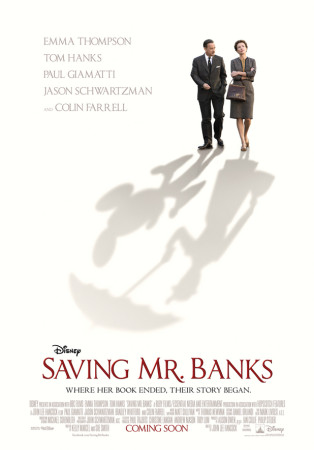‘Saving Mr. Banks’ is as sweet as a spoon full of sugar
“Saving Mr. Banks,” the tale of how the classic film “Mary Poppins” came to life, is as heartwarming as it is heartbreaking. I found myself smiling and crying through the touching story of how Walt Disney (Tom Hanks) gained the rights to the book-turned-movie from the author, P.L. Travers (Emma Thompson), who has more childhood baggage than Mary Poppin’s magic bag.
As the story of Travers’ journey to releasing the rights to her precious novel unfolds, the story of her tumultuous childhood is simultaneously told through consistent flashbacks. Having always adored her father, it is heart-wrenching to watch the child version of Travers see her father’s tragic alcoholism unfold along with her mother’s ensuing despair. It certainly explains the character’s deep-seeded attachment to her story’s characters, as Mr. and Mrs. Banks are based on her own parents and Mary Poppins is based off the woman who helped save her own family.
Emma Thompson plays Travers with the perfect amount of neuroticism and well-mannered, (very British) behavior. Her character makes the kinds of comments you would expect from your very proper but oh-so-oblivious aunt or grandmother, though Thompson is able to win me over nonetheless. The backstory is most likely the source of the sympathy I feel towards her character, whose doting and unwavering affection for her father drove the main point of conflict in the film, as she wanted his memory and that of her other characters to be properly preserved.
Travers’ father, played by Colin Farrell, was another amazingly intricate character, though the part itself seemed simple. The whimsy and love that the character has for life and his family is equally matched by his depression, which he self-medicates with alcohol. Each time he disappoints his family, Travers only seems to care for him more.

Though I can imagine how this type of film, with two such removed plotlines, could become confusing or distracting in itself, the use of the flashbacks in “Saving Mr. Banks” is what makes the story so special. The characters in both of these plotlines were what I fell in love with the most, as they were effortlessly complex, creating a web of characters that enhanced one another with every opportunity.
Even the more minor characters in the film had a distinct purpose and were just that: characters. From the office secretary to Travers’ driver and, my personal favorite, Ralph (Paul Giamatti), every character felt real and had depth. The character of Ralph in particular surprised me, becoming the perfect unsuspecting friend of Travers, touching each other’s lives equally with their bits of clever wisdom and insight.
Travers gave tidbits of wisdom very similar to that of her beloved Mary Poppins, another popular aspect of the film in itself. Every Mary Poppins reference is bound to make you smile. Even just listening to the Poppins-infused score of the film will make you feel lighter and happier, like a kid sitting down to watch Mary Poppins for the first time.
Though the “based on a true story” nature of the film is bound to invite commentary about how true the story actually is, the film appears to have its facts correct, with its fair share of Hollywood adjustments. The fact is, the films truthfulness and relatability to such a well-known and loved classic is what makes the story unique.
The only character I did not find myself completely satisfied with was Walt Disney himself. Though I am still a huge fan of Tom Hanks, his character was the most superficial of the lot. He had some depth but was definitely lacking. Though Disney was the warm and kind character you would expect, his role in the movie was really that of the person trying to pry the rights to the film out of the author’s hands, which is not quite as warm and fuzzy. In the end, though, I still found myself rooting for the character, unable to separate him from my love of Disney in general.
From the subtle humor to the clever and cherished Mary Poppins references, I fell in love with the details as much as I did the story and rich character development. “Saving Mr. Banks” makes for the perfect holiday flick to see with the family, and I know I will be watching it again and again.
Karly Horn is an A&E Editor for The Patriot and jcpatriot.com.



